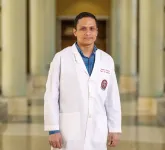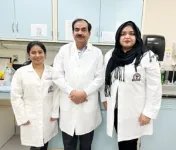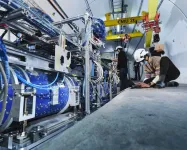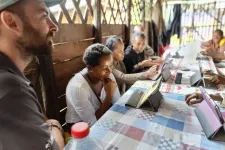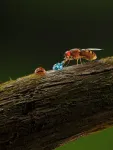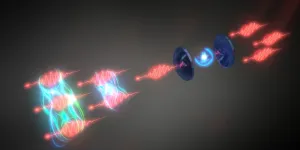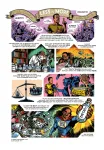(Press-News.org)
Cancer, in all of its forms, is a public health concern responsible for more than 8 million deaths each year in the United States. In addition to its effect on patients and the health care system in general, cancer also places a burden on non-professional caregivers such as family members and friends. This can be especially true for the Hispanic population, where communication barriers, financial difficulties and sociocultural issues can be significant.
In a recently published review article, Jasbir Bisht, a cytogenetic technologist for the Department of Pediatrics-Genetics Unit at the Texas Tech University Health Sciences Center (TTUHSC) School of Medicine, and a team from P. Hemachandra Reddy’s internal medicine laboratory at TTUHSC analyzed the impact of cancer in Hispanics in comparison to other ethnic groups. Their study focused on the status and needs of those who serve as caregivers, particularly informal caregivers such as family members or friends.
The article, “Caregivers with Cancer Patients: Focus on Hispanics,” was published in January by Cancers, an open access journal of oncology. The research team, which was led by Reddy, also included TTUHSC research aide Priyanka Rawat and Ujala Sehar, Ph.D., a post-doctoral researcher for the Reddy Laboratory.
The Hispanic community is generally considered to be the second largest in the U.S., though 2022 estimates say Hispanic or Latino residents have likely surpassed non-Hispanic whites as the predominant population. Because the Hispanic population continues to expand, Bisht said the study used the total number of cancer patients gleaned from the 2020 census data and estimated the number of new cancer patients through 2022.
“We estimated 126,000 new cases are being diagnosed yearly in Hispanics,” Bisht said. “A more significant number of patients means more caregiving burden is placed upon the immediate family members and friends.”
When compared to other major racial and ethnic groups, the Hispanic population has the highest prevalence of some important and potentially modifiable cancer risk factors, including type 2 diabetes mellitus and obesity. Hispanics also are more frequently diagnosed with advanced stages of cancer and have a lower quality of life after receiving a cancer diagnosis than non-Hispanic whites.
Multiple factors can significantly affect the prognosis of cancer in Hispanics. However, oncology researchers have typically focused on the behavioral and psychosocial aspects of non-Hispanic whites, while any understanding of the complex array of prognostic variables in Hispanics is limited. For this reason, the authors of the article sought to provide insight about the obstacles facing Hispanic cancer patients and their caregivers. These issues include:
Socioeconomic status, which affects cancer risk factors such as physical inactivity, tobacco usage, lack of adequate nourishment and obesity. Other socioeconomic factors include a lack of health insurance, low incomes and elevated poverty rates, which have been linked to late-stage cancer diagnosis and lower cancer survival rates.
Cultural differences, which can impact a Hispanic patient’s physical, psychological, social and spiritual well-being. Family and religious faith also play a significant role in Hispanic culture.
Linguistic barriers, which often result in Hispanics (and other ethnic and minority groups) receiving lower-quality health care services, makes them less likely to undergo routine medical procedures and leads to higher rates of morbidity and mortality. It also creates a general mistrust of physicians and other health care providers.
Comorbidities such as type 2 diabetes mellitus (the rates of which are two to five times higher than non-Hispanic whites), obesity and hypertension. Obesity and being overweight are directly related to an increased risk of colon, rectum and breast cancer. Visceral obesity, where the fat encases organs deep inside the belly, also is believed to be associated with colorectal cancer and potentially increases the risk of pancreatic, endometrial and postmenopausal breast cancer.
Reddy said his laboratory focuses on caregiving for cancer patients in Hispanic communities to create an understanding of the burden faced by caregivers. This is especially important now because many cancer treatments take place in an outpatient setting rather than a hospital, which has significantly increased the burden on immediate family members and friends in caring for cancer patients.
“This review can help Hispanic community caregivers in many ways, especially in coping with their situation while caring for cancer patients,” Reddy said. “We have given many suggestions, such as self-care as a way for caregivers to handle anxiety, depression and stress, and how to maintain or upgrade to a healthier lifestyle.”
Currently, members of the Reddy Laboratory are actively investigating issues faced by caregivers of patients with dementia, diabetes, obesity, hypertension and other comorbidities. Bisht said he appreciates the support and encouragement he has received from the Reddy Laboratory and from TTUHSC leadership in conducting these reviews because they can help improve health care in our communities.
“Hopefully our article and on-going work can be used by health care professionals, physicians and policy makers in state and federal agencies,” Bisht added. “We hope to address some of these issues and improve the situations for all patients and their caregivers.”
###
END
In recent years, teleworking – spurred by the implementation of information and communication technologies and the recent pandemic, particularly – has become a feature of many jobs. Many companies have now made this form of working available to their employees, but it is still far from common practice in today's labour market.
Universitat Oberta de Catalunya (UOC) researchers have analysed the different perspectives and perceptions on teleworking, looking at the wide range of ...
A team including physicists of the University of Bern has for the first time detected subatomic particles called neutrinos created by a particle collider, namely at CERN’s Large Hadron Collider (LHC). The discovery promises to deepen scientists’ understanding of the nature of neutrinos, which are among the most abundant particles in the universe and key to the solution of the question why there is more matter than antimatter.
Neutrinos are fundamental particles that played an important role in the early phase of the universe. They are key to learn more about the fundamental ...
Cast your mind back to the spring of 2020, when grocery store shelves sat bare of essential items and ingredients. For birds who live in the forests of Central America, replacement of forest land with coffee plantations essentially “clears out the shelves” of their preferred foods, causing them to shift their diets and habitats to survive.
A new study led by researchers at the University of Utah explores a record of birds’ diets preserved in their feathers and radio tracking of their movements to find that birds eat far fewer invertebrates ...
Custom-made to attack cancer cells, CAR T-cell therapies have opened a new era in the treatment of human cancers, particularly, in hematologic malignancies. All too often, however, they display a frustrating trait inherited from the body's own immune system cells: a drastic loss of cancer-fighting fervor known as "exhaustion”. Exhaustion is not only seen in cancer-fighting T cells but is also frequent in the setting of viral infections, such as human immunodeficiency virus (HIV), hepatitis B/C viruses (HBV, HCV) and COVID-19 (SARS-CoV-2).
The lapse into listlessness has diminished the effectiveness of CAR T-cell therapies in some patients and prompted scientists to try ...
When a family of five-ton elephants stomps and chomps its way through your crops, there’s only one winner. And in the central African nation of Gabon, farmers are getting fed up with the giant animals trampling their fields—and their livelihoods.
In conservation terms, Gabon is a success story—protected areas and tough anti-poaching measures have allowed the numbers of critically endangered African forest elephants to stabilize. But with food prices rising, anti-elephant protests have been spiking too. “Some people cannot farm anymore—the elephants are eating so much of their crops,” Gabon’s environment minister ...
SEATTLE – Institute for Systems Biology (ISB) researchers have constructed biological body mass index (BMI) measures that offer a more accurate representation of metabolic health and are more varied, informative and actionable than the traditional, long-used BMI equation. The work was published in the journal Nature Medicine.
For decades, clinicians have relied on BMI as a crude tool to classify individuals as underweight, normal weight, overweight or obese. BMI scores are calculated by dividing a person’s weight in kilograms by height in meters squared. About 30 percent of the population is misclassified by this approach. Despite its limitations, ...
PHILADELPHIA (March 20, 2023) – The sense of taste is among the first to come into contact with food before we ingest it, but whether animals can taste basic or alkaline food and how they do it remained unclear until now. A research group led by Yali Zhang, PhD, Principal Investigator at the Monell Chemical Senses Center, recently addressed this significant question, as they similarly did for sour taste in 2021 on the lower end of the pH scale. Their work, published today in Nature Metabolism and highlighted in Nature, identified a previously unknown chloride ...
For the first time, scientists at the University of Sydney and the University of Basel in Switzerland have demonstrated the ability to manipulate and identify small numbers of interacting photons – packets of light energy – with high correlation.
This unprecedented achievement represents an important landmark in the development of quantum technologies. It is published today in Nature Physics.
Stimulated light emission, postulated by Einstein in 1916, is widely observed for large numbers of photons and laid the basis for the invention of the laser. With this research, stimulated emission has now been observed for single photons.
Specifically, ...
Muscle degeneration, the most prevalent cause of frailty in hereditary diseases and aging, could be caused by a deficiency in one key enzyme in a lipid biosynthesis pathway. Researchers at the Institute of Molecular Biotechnology (IMBA) of the Austrian Academy of Sciences characterize how the enzyme PCYT2 affects muscle health in disease and aging in laboratory mouse models. The findings are published on March 20 in Nature Metabolism.
Muscle degeneration in inherited diseases and aging affects hundreds of millions of people ...
Figuring out a lie has never been easier: forget body language or how convincing the message is, just listen to how detailed and rich the story is. This is the core of a new approach to lie detection, say researchers from the University of Amsterdam's Leugenlab (LieLab) in collaboration with researchers from Maastricht University and Tilburg University.
Since 9/11, security staff have been trained to recognise no less than 92 signals that someone might be lying. Bruno Verschuere, associate professor of Forensic Psychology: ‘This ...
